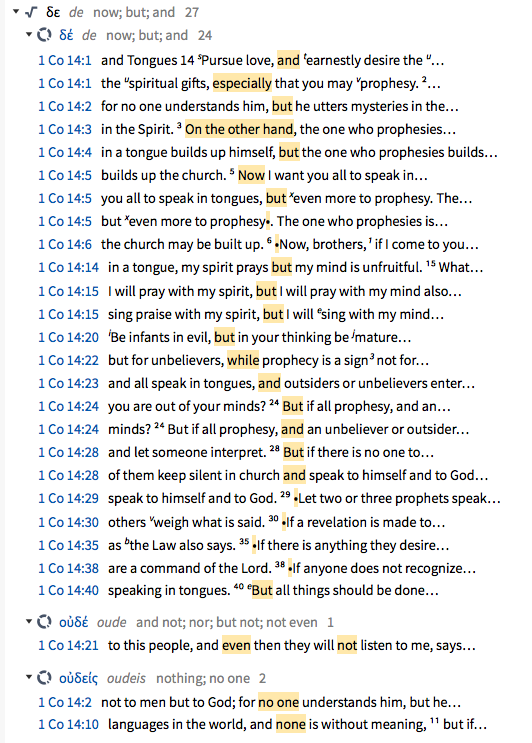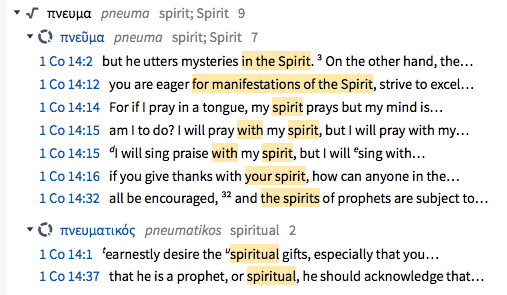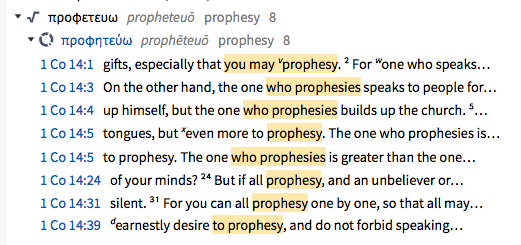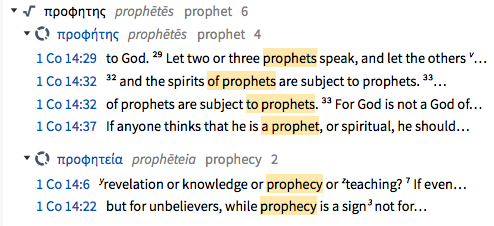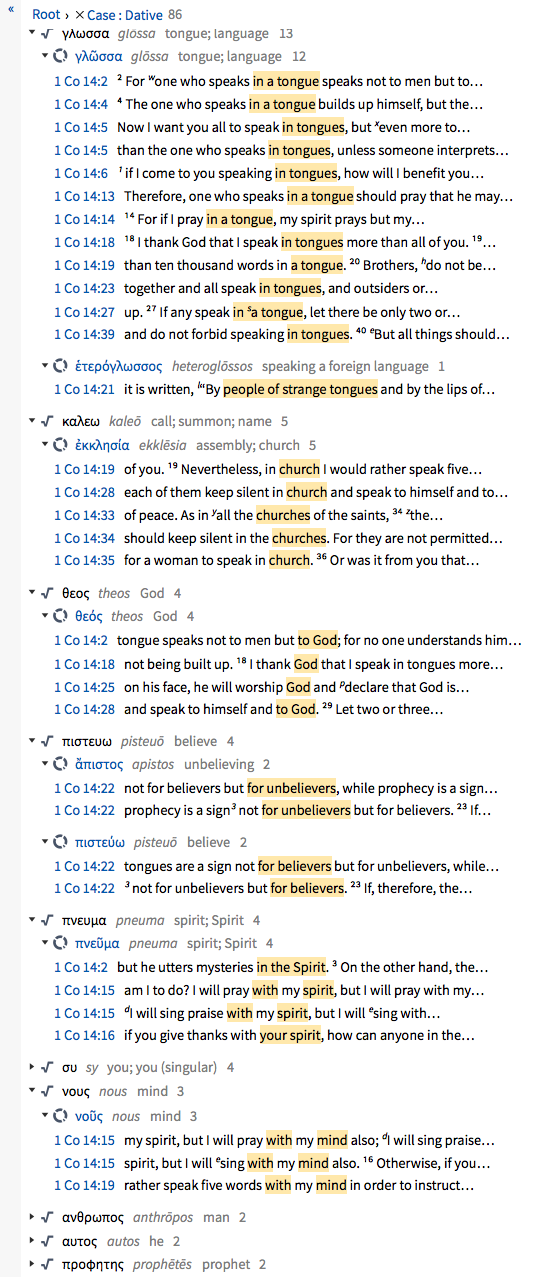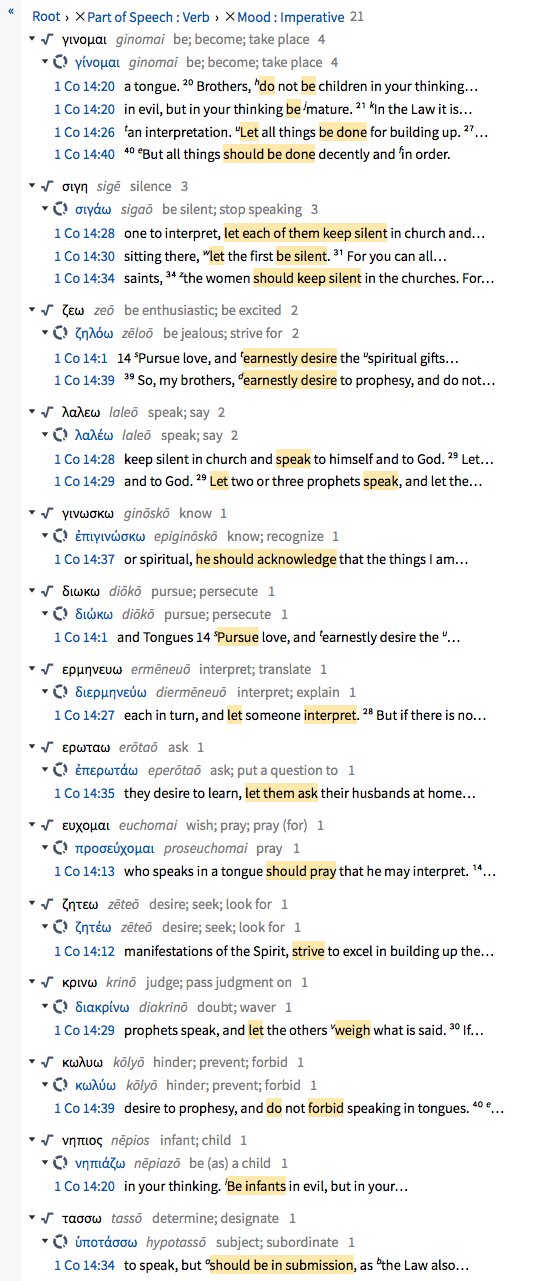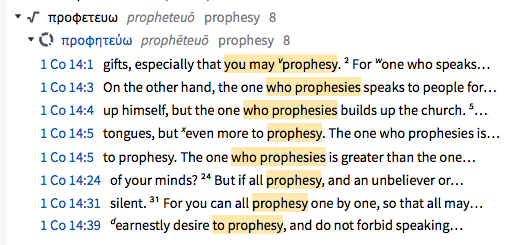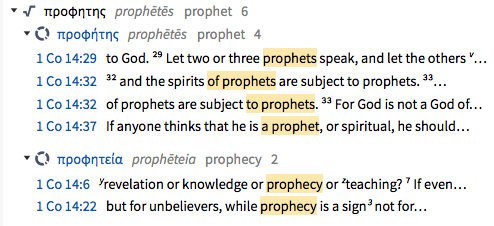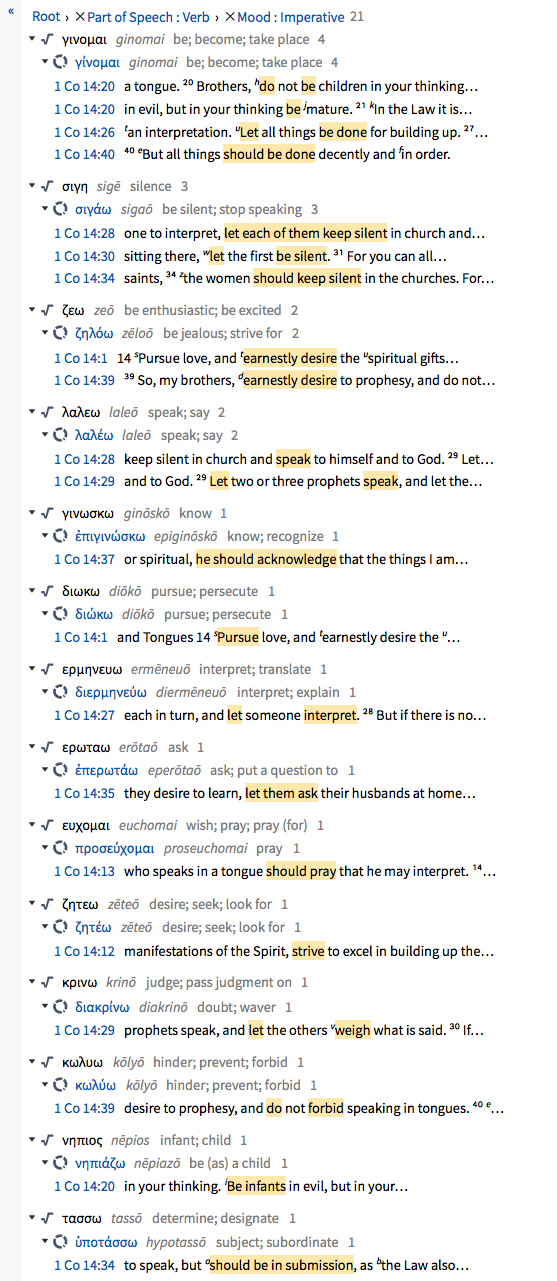Updated 3/27/18
1 Cor 14
Study resources for 1 Cor Ch 14 are here (updated 3/27/18): 1 Cor 14 NKJV Interlinear, with Codes
Context
It is important to observe that the context here is a continuation of the subject of spiritual gifts that began in Ch 12 and continued in Ch 13. Here in Ch 14 in the light of Ch 13 giving us the absolute necessity of the agape-love expression of the gifts of the Holy Spirit by the activity (agape-love) of the Holy Spirit, the Corinthian Epistle returns to the practical, proper outworking of the gifts, in particular the gift of “tongues” (languages / communication by words).
A little verse math is instructive: 1 Cor 12 has 34 verses, 1 Cor 13 has just 13, and here 1 Cor 14 has 40 verses. Some key points:
- These three chapters, comprising 84 verses, represents a significant portion of the entire 1 Cor Epistle (about 20%, as the entire Epistle has 437 verses).
- In between the major chapters on gifts–Ch 12 (34 verses) and Ch 14 (40 verses)–sits the very important, succinct, and commonly mis-applied Ch 13 (just 13 verses).
- The gifts of Ch12 simply do not ‘work’ properly, in the energy and power of the Holy Spirit unless they are brought to life by the Holy Spirit as given in Ch 13.
- Otherwise, the body of the church experiences the disorder / chaos that is the context of mis-application of the gifts as given in Ch 14.
It is also important to remember that the entire Epistle has the context of disorder, even chaos. This aspect began in the beginning, in Ch 1, where the serious confusion of who is the object of worship is addressed. It was absolutely necessary for the Corinthians to understand that it was to be Jesus Christ, and not some ‘Jesus’ as someone like some ‘great man / teacher’ in the same category as some might think Paul, or Peter, or Apollos, as the Corinthian church was viewing it. The object, the point of the church and our life, is that it is following the Lord Jesus Christ, where “Lord” is the clear title / name of God Himself as He encounters man, beginning in Gen. 2 by the Heb. word “Yahweh” (or Jehovah, from the Heb. YHWH, the Tetragrammaton). If Jesus is not “Lord” (God) then his words cannot be rationally understood. If you try to read the Gospel testimonies (as given in / by Matthew, Mark, Luke, and John) from the perspective that Jesus was not Lord-God, then you must conclude that he was insane or the Devil Himself. His words cannot be cohered in any other way but for His claim that He was truly God, and of course truly man. (This point was made widely by CS Lewis by his term “the trilemma:” either Jesus was who He said He was, or He was the Devil incarnate or an insane man).
Important Aspect of 1 Cor 14: Conditional Phrases
One of the powerful communication tools of language is the “if…then” clause. (The formal term for such construction is apodosis).
If / Then Type Sentences
In our Ch 14, there are 18 such conditional phrases as given in the graphic below. The use of such construction is an important feature of this chapter because the Apostle Paul (the Holy Spirit through Paul) is emphasizing the need for the Corinthians, and of course us, to think straight, logically, ordered, in an otherwise disordered world, as the Corinthians give ample evidence, as do our own minds processing the mess in which we all live, and breathe, and think. So, think of the 18 below phrases as God’s work to lash together important ideas in a logical, coherent fashion, and restore us to be able to grasp God’s purposes, much like the Spirit of God hovered over the formless and void mess in Gen. 1:2 as the great initial act of restoration. 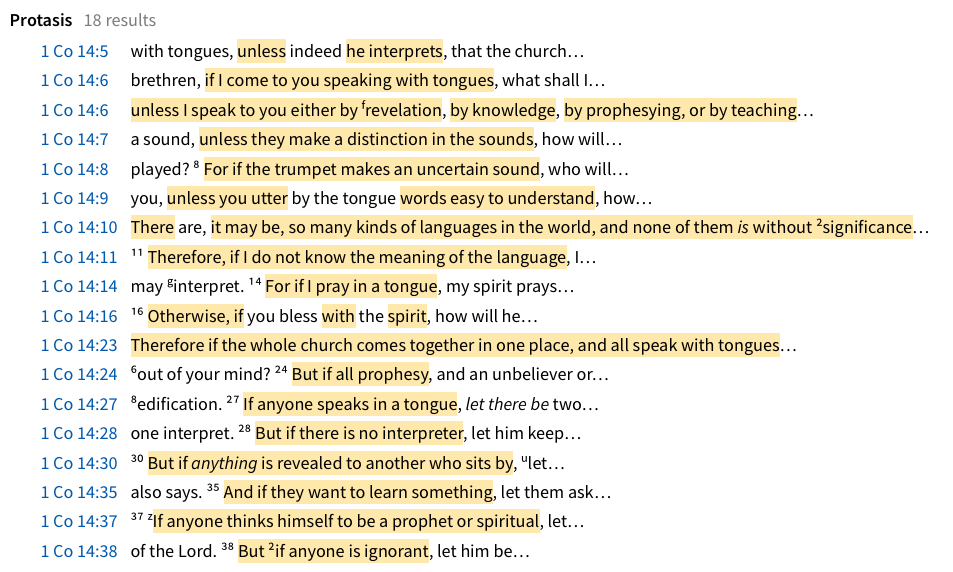
Every above verse has the highlighted clause beginning with the word “if” or “unless” (which is a word the translators used to replace “if”). “If,” like many short, common words, passes by us without us giving them much thought. So let’s pause and give it some thought.
What does a phrase (clause) that begins with the word “if” (or “unless”) actually ‘do’ (it’s purpose) in a sentence? (Sometimes we use other words instead of “if” that performs the same function, such as the word “unless” as used in the above graphic in verses 5, 6, 7, etc.; these are examples where the translators of the Gr mss has substituted “unless” for the Gr word that is literally “if” because the construction of the Gr better makes sense in English by the word “unless;” more on this below).
One obvious answer is that our mind begins an immediate alert to look for the word “then” that heads another phrase (clause) in that sentence. So one purpose of conditional phrases (“if” clauses) is to cohere, join together, two parts of a sentence in some form of tight, logical structure. (The “then” is not always explicitly given, but sometimes implied; if there’s an “if” there is [almost always] some kind of ‘so what’ that connects with it).
Further, the use of an “if…then” conveys a logical relationship that enables building up a body of truth. Back in high school geometry we learned about proofs of simple theorems being important as such proofs were then used to develop proofs of more complicated theorems. When one builds a structure, one starts with some kind of foundation, and there can be no second floor or roof without some kind of first floor on that foundation.
So, in the above verses, we to create a building of interconnections that portray some aspect of a true reality. The building begins, sentence by sentence, with laying a foundation by the “if” clause, which proposes that the reader accept as true such clause (even if it is later shown to be untrue–more below), so that what follows is the “then” clause either expressly given or implied. The negative form of the “if” clause is used to show that the “if” cannot be true (i.e., is not a correct depiction of reality) because it logically connects to a “then” clause which is clearly not true. In either the positive or negative form of the conditionals, the “if” and the “then” are interconnected, and one ‘teaches’ the truth of the other, like the washing of our hands, one hand must connect with the other to get that job done.
Sentences That Hinge on the Word “but”
Another language tool for establishing contrast is with reference to the Gr. particle de (pronounced: day). It has an elastic range of meanings generally around the English word “but,” meaning a demarcation in the sentence setting off contrast, namely something that comes after the initial clause(s) is different in some important aspect.
The Gr word de occurs 27x in this Ch 14, another indication of the importance of such contrast. The contrast here is by means of communication, namely by “tongues” contrasted with that by “prophecy” or “interpretation.” All the occurrences of de in 1 Cor 14 are shown in the below chart.
The Ultimate Purpose of Communication: Building Up the Church
Yet another and even more important indication of the significance of contrast in 1 Cor 14 is by noting the object / purpose of the communication. Again there is a contrast between “tongues” and “prophecy” (and interpretation). The indicator word is the Gr. oikodomeo, which means building up, or strengthening. Proclaiming God’s word intelligibly in ordinary terms is (1) oikodomea and (2) of the church (Gr ecclesia). Below is a chart of all the occurrences of oikodomea in 1 Cor 14. Reference to the study resource pdf given in the beginning paragraph of this Ch 14 study has oikodomea identified.
Key Words in 1 Cor 14
Below are a series of charts of the key works in this chapter.
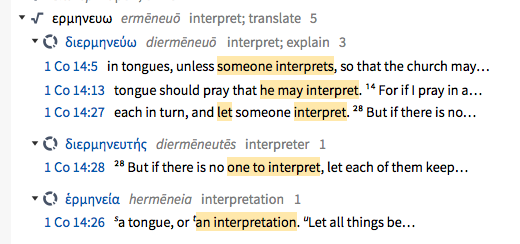
Key Sentence Constructions
Below are the references to the most important (by frequency with key words) of the many, many dative cases in this Ch.
In English, the dative case normally is used of an indirect object: John his the ball [the DIRECT object] to Jim [Jim is the INDIRECT object]. And in English, there is not any tags added to such indirect object highlighting such use; we rely on the syntax of the sentence to infer that meaning.
In Gr there is the use of tags (inflections) to highlight dative (and other) cases. Further the dative case is used in a far richer range of meanings that can be key to understanding any passage. Below is a small teaching on the dative case. For most purposes the important uses of the dative case are listed items 1-3 below: Indirect object, Instrumental (means), and Location.
Dative Case
- Indirect Object. [TO] The dative names the person or thing to which something is done or given. Indirect objects may also be introduced by a preposition. (Matt. 18:26)I will repay all things to you
- Instrumental (or Means). [BY, BY MEANS OF, WITH] The dative shows the instrument or means by which something is accomplished. It is used less frequently than ἐν + dative. (Mark 5:5) slashing himself with stones. (Eph. 2:8) for by grace you are saved
- Location (or Locative). [IN, AT, AMONG] It indicates the place or sphere in which something happens. In NT Greek it is often replaced by ἐν + dative. (Acts 14:16) He allowed all nations to walk in their ways
- Point of Time. [ON] A special use of the dative of location. (Matt. 20:19) And on the third day he will be raised
- Possession. When possession is shown by the dative, NT Greek sometimes preserves the classical emphasizing of the thing possessed. It is used with εἰμί, γίνομαι, or ὑπάρχω and is translated like a possessive genitive. (Luke 1:7) and they had no child (literally, and there was not a child to them)
- Direct Object. Some verbs that emphasize a close personal relationship take a dative direct object; e.g., verbs of serving, showing, trusting, following, telling to, commanding, obeying, thanking, and some verbs that are compounded with ἐν, ἐπί, παρά, πρός, or σύν. (Mark 1:27) they obey him
- Reference (or Respect, Interest). [WITH REFERENCE TO, ACCORDING TO, ON ACCOUNT OF] It shows an interest that is more remote than the indirect object. (Rom. 6:10) He died with reference to sin (or “to sin”; (Gal. 6:12) so that they might not be persecuted because of the cross of Christ
- Advantage or Disadvantage. [FOR, AGAINST]. (Rev. 21:2) prepared as a bride adorned for her husband
- Manner (or Accompanying Circumstance). The dative case may show the manner of an action, approaching an adverbial meaning. (1 Cor. 11:5) but every woman praying with head uncovered…
- Association. [WITH] Many times the dative will appear alone in a construction that could have σύν + dative. (Acts 28:15) unto a meeting with us
- Agency. [BY] As the personal agent of a passive action, this dative is similar to ὑπό + genitive. (Luke 23:15) And behold, nothing worthy of death has been done by him.
Chapman, B., & Shogren, G. S. (1994). Greek New Testament Insert (2nd ed., revised.). Quakertown, PA: Stylus Publishing.
Tongues
The dominant word in 1 Cor 14 is translated “tongues” and could be translated “languages” (more on this below). The Gr word is glossalia, which can mean the tongue in the mouth, a language, and a ‘tongue like’ shape like tongs on a pitchfork or such.
What is dramatic about the word glossalia is that it occurs as “tongue” or “tongues” in the NKJV NT 52 times, 22 of which is in 1 Cor, all of which occur in Ch 12 and 14, in the context of gifts.
Tongues occurs twice in Romans (3:13 and 14:11) with a clear reference to language, and outside of any Spiritual gifts context.
Likewise it’s used for literal language in its only occurrence in Philippians (2:11), and once in the Pastoral Epistles (1 Tim 3:8). Additionally it occurs once each in 1 Peter (3:10) and 1 John (3:18), likewise in the sense of ordinary language.
Finally in Revelation the word occurs eight times, again always in the context of ordinary language (words).
So, outside of 1 Cor, there is not a single use of tongue(s) in reference to Spiritual Gifts or any possible interpretation of some unknown language, or a language known only to Beings outside of Space-Time, in any of the Epistles or the Book of Revelation.
There are, however, six occurrences in Acts, all of which, or five of which, appear to be related to the exercise of the Spiritual gift of tongues: 2:3, 4, 11; 10:46; 19:6; and possibly 2:26.
To discern the Bible’s teaching on tongues we need to distinguish between
- Tongues as a sign
- Tongues as a supernatural form of communication of content / information,
- Tongues as an ordinary, though perhaps exceptional, form of human language communication.
Tongues as a Sign
Tongues as an Expression of Truth (Content)
Tongues as Ordinary Language
Commentaries on Tongues
As one might imagine, the literature regarding tongues is vast, and of widely contrary opinions. Below are two careful expositors John MacArthur and the late J Vernon McGee.
MacArthur Study Bible 1 Cor 14
Prophesy (noun and verb) and Prophet
There are three words that derive from “Prophesy:” the noun form of the act of speaking forth on behalf of God, the person who does so, and the verb of doing so.
These three word forms are an important counterpoint and context to the many references to “tongues” in this chapter as cited above.
Occurrences of Prophesy
Here are the occurrences of these three related words and associated Strongs Number:
Meaning of Prophesy
Below are excerpts of definitions of this important word. The root idea is a speaking forth (or the speaker himself) of God. In order words, the words being spoken into space-time are the very words of God were He to speak directly to us. This is an incredible claim. It was fulfilled in two different contexts: those who spoke God’s words which had not been previously disclosed by God Himself or another of His prophets, or those who speak forth God’s already reveal words.
In the former category are those words which speak of the past and present, and even the future (fore-telling). In the latter category, there is no fore-telling (predicting the future) independently of what has been written and affirmed by God in His word; there is only forth-telling from the reveal word of God.
Below are some texts on this important distinction (all from S. Zodhiates, The Complete Word Study Dictionary: New Testament, AMG Publishers, 2000):
4394. προφητείαprophēteía; ...fem. noun from prophēteúō (4395), to prophesy. A prophesying or prophecy.
(I) Particularly prediction, the foretelling of future events, including the declarations, exhortations, and warnings uttered by the prophets while acting under divine influence; …
(II) Prophecy, meaning the prophetic office, the prophetic gift, spoken in the NT of the peculiar charisma or spiritual gift imparted to the primitive teachers of the church…
(V)A prophecy is something that any believer may exercise as telling forth God’s Word. This, however, does not make him a prophet (prophḗtēs [4396]) which is used in the NT in a very restrictive sense. A prophet prophesies, but one who prophesies is not necessarily a prophet.
…
(XI) In Rom. 12:6 by the use of the phrase “according to the proportion [analogía {356}] of faith,” the apostle declares that a prophecy is required to agree with the accepted doctrines of the faith; while in 1 Cor. 12:10 “discernings of spirits [diakríseis pneumátōn {1253}],” shows that the gift of prophecy was a regular practice (1 Cor. 14:29). The rule of edification is central in the rules laid down in 1 Cor. 14:26ff. for prophetic and other utterances. Two or three prophets may speak, while the rest are to evaluate their addresses; but if a “revelation” be given to another sitting by, the first prophet must keep silent. “Ye may all prophesy one by one, that all may learn, and all may be comforted. And the spirits of the prophets are subject to the prophets” (14:31, 32), which means that although individual inspirations are legitimate and undoubted, they are subject to the control of the prophets collectively. …
4395. προφητεύω prophēteúō; To prophesy.
(I) To foretell things to come…; to declare truths through the inspiration of God’s Holy Spirit whether by prediction or otherwise …
(II) To tell forth God’s message, hence the noun prophḗtēs (4396), prophet, is the proclaimer, one who speaks out the counsel of God with the clearness, energy, and authority which spring from the consciousness of speaking in God’s name and having received a direct message from Him to deliver. Thus one may prophesy without being a prophet in the strict sense of the word. A prophḗtēs, both in the OT and NT, is not primarily one who foretells things to come, but who (having been taught of God) speaks out His will ….
4396. προφήτης prophḗtēs; masc. noun from próphēmi (n.f.), to tell beforehand, which is from pró (4253), before or forth, and phēmí (5346), to tell. A prophet, a foreteller of future events, also an interpreter, what the Greeks called ho mántis (n.f.), the one who received the oracle. In the NT prophḗtēs corresponds to the person who in the OT spoke under divine influence and inspiration. This included the foretelling future events or the exhorting, reproving, and threatening of individuals or nations as the ambassador of God and the interpreter of His will to men ( 2). Hence the prophet spoke not his own thoughts but what he received from God, retaining, however, his own consciousness and self–possession (Ex. 7:1; 2 Pet. 1:20, 21; especially 1 Cor. 14:32). In a general sense, prophḗtēs is used for any friend of God to whom He makes known His will, such as Abraham (Sept.: Gen. 20:7) and the patriarchs (Sept.: Ps. 105:15).
…
(VI) In Eph. 2:20; 3:5, the prophets, named side by side with the Apostles (meaning the Eleven and those who were commissioned by Jesus directly) as the foundation of the NT church, are to be understood as exclusively NT prophets. They are listed in Eph. 4:11 between apostles and evangelists (see 1 Cor. 12:28). NT prophets were for the Christian church what OT prophets were for Israel. They maintained intact the immediate connection between the church and the God of their salvation. They were messengers or communicators. Such prophets were not ordained in local churches nor do they have successors.
(VII) The office of a prophet should not be confused with prophecy or the gift of prophecy which pertains to all believers (1 Cor. 13:8; 14:3; 1 Tim. 1:18; 4:14; Rev. 11:6). Hence, the significant admonition in 1 Thess. 5:20, “Despise not prophesyings.” One thing must be remembered, namely, that he who prophesies is not necessarily a prophet in the OT or NT sense of a restricted office.
Imperative Verbs in 1 Cor 14
The verbs in the imperative mood (sense) in this chapter are shown in the graphic below:
Order / Disorder
The issue of order and its absence is a central theme of the Corinthian Epistle and condition of that body of believers. The Gr word for “order” is tasso, in all its various forms. It is useful to consider more carefully what that word means and, so, why it is such a central idea in that church and any body of believers since Corinth.
A summary of an important form of the Gr word tasso is given here: Strongs G5293 Hupotasso
________________
1 Cor. Ch 15 is here:
